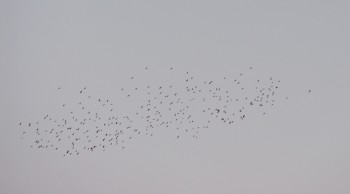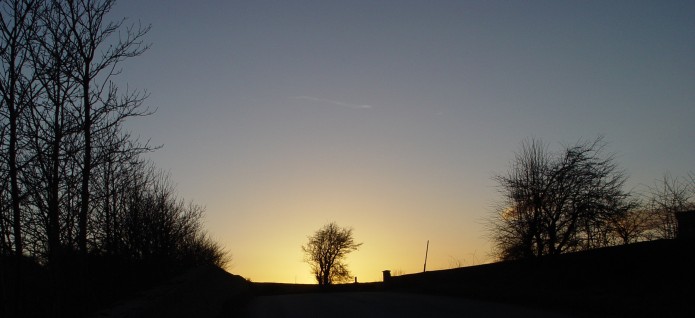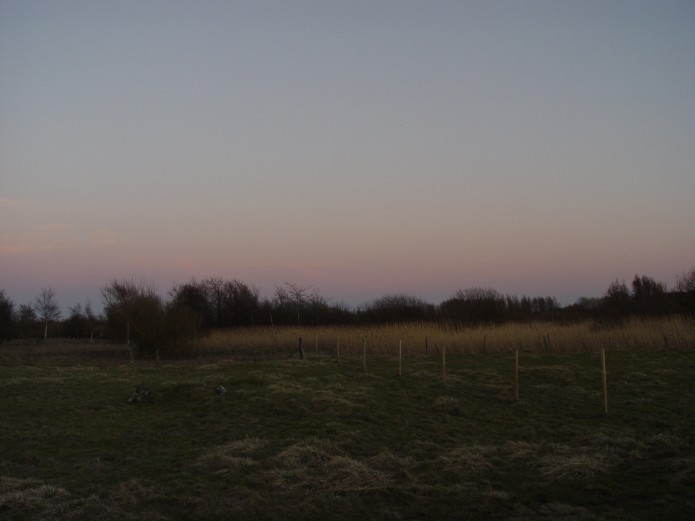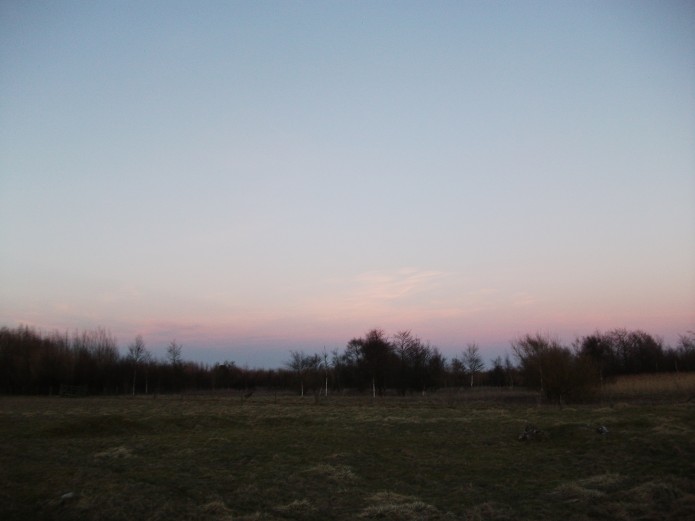Our first outing in the new car!
Originally, I thought we’d spend our first weekend figuring out all the things the car can do – reading the manuals and playing with all the gadgets.
But then, I read in one of the local papers about a particularly impressive flock of starlings worth seeing. I’m no bird watcher – I haven’t the patience – but I’ve seen videos of the acrobatics that starlings get up to, and it seemed well worth going to see. So I marched right up to Chris, thrust the paper at him, ignored the look of confusion on his face, and announced that we’d be going to this the very first weekend we had the car – and hoping it wasn’t too late.
The paper says they roost in this spot from October to March, and this would be the first weekend of March. I didn’t know a thing about the birds, and English being the ambiguous language that it is, and nature not paying attention to a calendar anyway, I didn’t know if that included March or not. We just went and hoped for the best. Saturday was a gloriously sunny day, so we went then.
Once I got home, I looked up starlings a bit, and discovered that they flock together in these huge murmurations in the non-breeding season; they’re at their largest in the winter, when joined by birds that have migrated over from Europe (for the milder climate). Aha – so we just caught the tail end, that explains why we didn’t see the 40,000 to 70,000 that the paper talked about. No matter; we’ll go back later on this year, in November/December, and hope to see more. It was really peaceful and pleasant as it was, so we both enjoyed it.
Unfortunately, none of my video came out well – it is not a Serious Camera, and it struggled with the birds as far away as they were, in the low light. Go watch this one from the RSPB instead.
Apparently, they’re choosing a place to roost while they’re doing their acrobatics. Chris reckons the sounds they’re making are, “I call dibs on that branch!” “No, I do!” and so on. 😉
The drive was really pleasant. It’s about half an hour’s drive away, through our rolling countryside. Since we were driving, we were able to scope out Chinley, a nearby town, since I need to drive there in a fortnight, on the way back.
I’ve read about these starling roosts in Derbyshire for years, but never been able or willing enough to get there. This particular one, it turns out, we could’ve gotten there on public transport, if we were really, really interested. The 18-mile, 30-minute drive there would’ve been 2.5 hours: one and a half hours by bus plus another hour of walking. Then, after watching for the display, we’d have had a 6 to 6.5 hour trek home. We could actually just walk home in that time, or we could:
- Walk an hour,
- Wait half an hour,
- Take a bus for 20 minutes,
- Walk 15 minutes,
- Wait 45 minutes,
- Take a train for 1 hour 5 minutes,
- Wait 1 hour 35 minutes,
- Take a train for 35 minutes,
- And then either:
- Walk another 30 minutes, or
- Take a cab for 5 minutes (and about £4).
All of the walking, except that very last 30 minutes (where we’d likely end up in a cab anyway, my feet having given out long before), would be along roads with no sidewalks (pavements), no shoulders, with cars zipping by in a 50 mph speed limit (so, y’know, generally going more than that, as they do everywhere). The trip back would be in the dark – and the countryside, of course, has no streetlights. We could, of course, have walked through the fields, as public footpaths crisscross the countryside, but one false step in the dark and we still might not have made it back. I’m afraid we’re really not that interested in birds – or anything else – to have made that trek.
If we made it, we’d have gotten home utterly exhausted, grimy, irritated beyond measure from the people, noise, and waiting we’d have put up with, and it would have been such a horrible experience, no matter how impressive the birds were – or whatever was at the other end of that trek. To add insult to injury, we’d have paid through the nose for it: the public transport would’ve been £50.20 (or about £55 with optional cab fare); the diesel for the car should have been about £4.72. Naturally, there are costs beyond the fuel, but they don’t add up that much, of course. The public transport companies are making money hand over fist.
So so so very glad we have another car, at loooong last!




